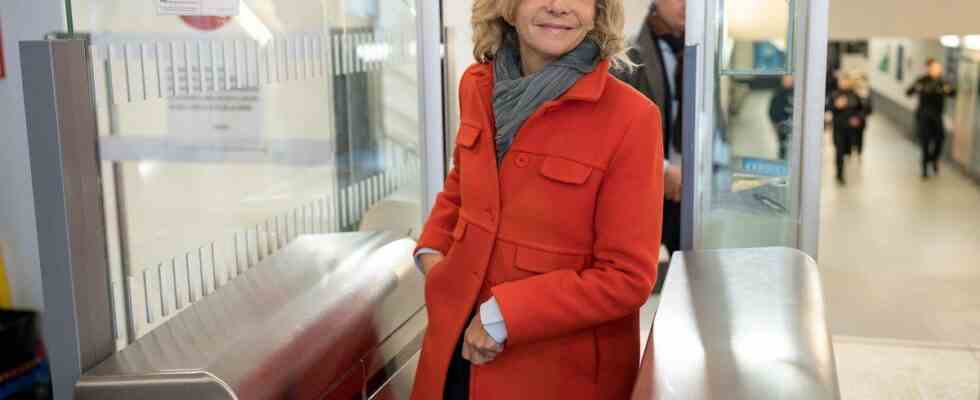Valérie Pécresse wants to put the package on safety in Ile-de-France public transport. In an interview with 20 minutesthe president of Ile-de-France Mobilités (IDFM) explains the various measures she intends to put in place, in particular the recruitment of a thousand security agents, and the requests she is making to the government.
Why would you want to add security guards to the 4,000 already present on the network when passenger traffic is rather stable?
We have seen a worrying increase in acts of violence in public transport since the end of Covid-19, while attendance is lower than in 2019. And I made a commitment during the regional campaign that the Ile-de-France residents would feel more secure in transport and that is why we are launching the recruitment of 1,000 additional agents by 2027. And I remind you that IDFM puts 160 million euros per year to ensure the human presence for transport security.
How to coordinate all these agents?
I want to convince the government to create a unified regional transport police. I recently asked Emmanuel Macron. It will be very useful during the Olympics because the risk of terrorism or serious accidents will be greater. The principle is to put under the command of IDFM the SNCF agents of La Suge [sûreté générale] SNCF, RATP, GPSR [groupe de protection et de sécurité des réseaux] and the private companies that run the buses. We want to have functional authority over these agents whose status will not change. They will intervene as soon as possible and as close as possible to the aggression.
And the idea is to put this regional police alongside the national police in the CCOS [centre de coordination opérationnelle de sûreté] which we have just financed at the police headquarters, and where the supervision of all the video protection cameras of the RATP, SNCF and police networks is grouped.
While waiting for this regional transport police, what are you doing?
I will create regional security brigades [BRS] with IDFM made up of three private security agents. In total, we are going to recruit 100 people and we will get them to intervene as soon as there is a problem and we will keep them on site to support the workforce while calm is restored. These BRS are there to prefigure the transport police that I call for.
I also asked Gérald Darmanin to submit the 2012 national police force. I have been fighting for ten years for the 1,350 police and gendarmes who were on the network to be restored. The agents we fund are not police officers, they cannot take complaints, have no investigative powers, even if they are armed and sworn.
What do you think of the contribution of new technologies, in particular artificial intelligence (AI), in the field of security?
IDFM is already financing the RATP’s artificial intelligence laboratory for 1.2 million euros and we are also supporting an experiment by the SNCF. The problem is that these are only experiments and what I really want is for us to move from experimentation to large-scale use on the network. How can we do this? We need a law authorizing it, that’s what I asked the President of the Republic last week. We ask to be able to use AI. For example, to quickly identify suspicious packages that completely block the network. We also need to be able to use it to identify cases of fraud.
What about facial recognition?
With all responsibility, and I said this to the President of the Republic, at the time of the 2024 Olympic Games, we are capable, with the 80,000 cameras on the network and the fact that all the stations have ticket validators, of setting up facial recognition in train stations for dangerous wanted terrorists. Because we are at risk of terrorism, it seems important to me to provide more security with a minimal restriction of freedom since it is just a question of determining whether the person passing through the gate is a wanted person.
The prospect of the Olympic Games should lead us to deal with this subject. The government does not want to talk about it, it is taboo. I think we have to break the taboo and see in which cases it is justified.
Did you feel that you were heard by the government on your requests?
I had the feeling that the prospect of organizing the Olympics raises awareness. And there was violence around the Stade de France [lors de la finale de Ligue des champions entre le Real Madrid et Liverpool] which opened the eyes of the government to the security risk that crowd movements can represent. But now we must act.
You want to open a training course for private security agents. What about?
We are working with the professional branch of private security to create specialized training in transport. We are asking for an evolution of their prerogatives, for example to be able to remove someone from the network. You realize that a private security guard who sees a violent guy can’t get him out of the network, he has to call his colleagues from the Suge or the GPSR. In addition, we have put a bonus of 2,000 euros for all those who come to train in security professions with a view to strengthening the workforce in Ile-de-France.

